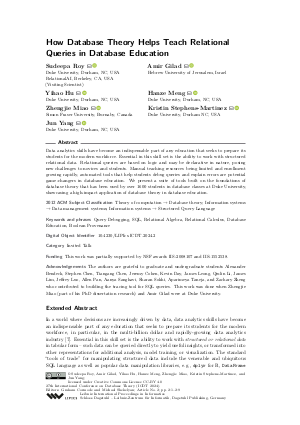LIPIcs.ICDT.2024.2.pdf
- Filesize: 0.64 MB
- 9 pages

 Creative Commons Attribution 4.0 International license
Creative Commons Attribution 4.0 International license

Data analytics skills have become an indispensable part of any education that seeks to prepare its students for the modern workforce. Essential in this skill set is the ability to work with structured relational data. Relational queries are based on logic and may be declarative in nature, posing new challenges to novices and students. Manual teaching resources being limited and enrollment growing rapidly, automated tools that help students debug queries and explain errors are potential game-changers in database education. We present a suite of tools built on the foundations of database theory that has been used by over 1600 students in database classes at Duke University, showcasing a high-impact application of database theory in database education.




Feedback for Dagstuhl Publishing